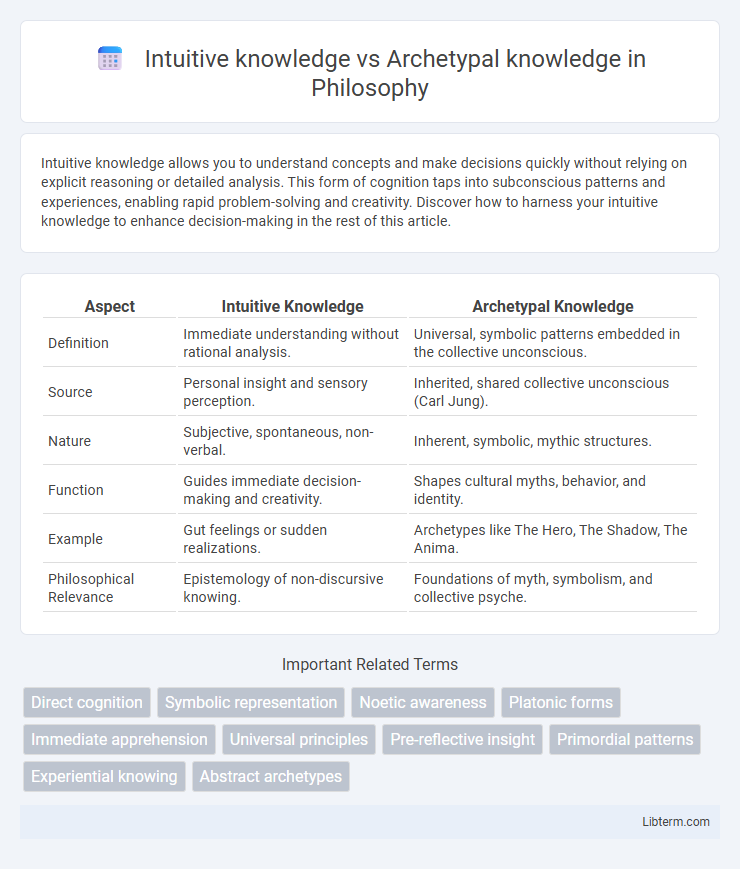Intuitive knowledge allows you to understand concepts and make decisions quickly without relying on explicit reasoning or detailed analysis. This form of cognition taps into subconscious patterns and experiences, enabling rapid problem-solving and creativity. Discover how to harness your intuitive knowledge to enhance decision-making in the rest of this article.
Table of Comparison
| Aspect | Intuitive Knowledge | Archetypal Knowledge |
|---|---|---|
| Definition | Immediate understanding without rational analysis. | Universal, symbolic patterns embedded in the collective unconscious. |
| Source | Personal insight and sensory perception. | Inherited, shared collective unconscious (Carl Jung). |
| Nature | Subjective, spontaneous, non-verbal. | Inherent, symbolic, mythic structures. |
| Function | Guides immediate decision-making and creativity. | Shapes cultural myths, behavior, and identity. |
| Example | Gut feelings or sudden realizations. | Archetypes like The Hero, The Shadow, The Anima. |
| Philosophical Relevance | Epistemology of non-discursive knowing. | Foundations of myth, symbolism, and collective psyche. |
Understanding Intuitive Knowledge
Intuitive knowledge arises from subconscious insights and immediate perceptions that bypass rational analysis, enabling rapid decision-making in complex situations. This form of knowledge is deeply rooted in personal experiences and emotional awareness, allowing individuals to grasp patterns and meanings without explicit reasoning. Understanding intuitive knowledge involves recognizing its role in creativity, problem-solving, and adaptive behavior where explicit data or archetypal frameworks are insufficient.
Defining Archetypal Knowledge
Archetypal knowledge refers to the universal, symbolic patterns and collective unconscious structures that shape human understanding across cultures and time, as identified by Carl Jung. It represents deep, inherited wisdom embedded in myths, dreams, and archetypes such as the Hero, the Shadow, and the Mother, serving as a framework for interpreting experiences beyond logical reasoning. This form of knowledge contrasts with intuitive knowledge, which is immediate, subjective insight without conscious analytical thought, highlighting archetypal knowledge's role in connecting personal intuition to shared human meaning.
Core Differences Between Intuitive and Archetypal Knowledge
Intuitive knowledge arises from personal experience and subconscious insight, allowing immediate understanding without logical reasoning, whereas archetypal knowledge is collective, rooted in universal symbols and patterns shared across cultures. Intuitive knowledge is fluid and context-sensitive, often guiding individual decision-making, while archetypal knowledge provides a structured framework reflecting common human experiences and mythologies. The core difference lies in intuition's subjective immediacy versus archetypes' objective, collective significance in shaping perceptions and behaviors.
Origins and Sources of Intuitive Knowledge
Intuitive knowledge originates from innate cognitive processes and subconscious experiences, often linked to evolutionary biology and pre-conscious pattern recognition within the brain. It is sourced from implicit learning, emotional resonance, and direct inner awareness, bypassing formal reasoning and analytical thought. This knowledge contrasts with archetypal knowledge, which is culturally transmitted and derived from collective symbols embedded in myths and shared narratives.
The Nature and Formation of Archetypes
Archetypal knowledge originates from the collective unconscious and embodies universal, symbolic patterns shared across cultures and generations. The nature of archetypes is inherently innate, shaping human experiences, perceptions, and behaviors through recurring motifs such as the Hero, the Mother, and the Shadow. Their formation occurs through inherited predispositions that emerge in myths, dreams, and art, reflecting fundamental aspects of human psychology and existence.
Cognitive Processes: Intuition versus Archetype Recognition
Intuitive knowledge relies on rapid, subconscious cognitive processes that allow individuals to grasp information without deliberate reasoning, often drawing from past experiences and sensory cues. Archetypal knowledge involves recognizing universal symbols and patterns embedded in the collective unconscious, enabling cognition through symbolic association and inherited mental frameworks. Both processes engage different neural pathways, with intuition activating the brain's right hemisphere and limbic system, while archetype recognition involves activation of the temporal lobes and areas linked to memory and symbolism.
Examples of Intuitive Knowledge in Everyday Life
Intuitive knowledge manifests in everyday life through instant problem-solving, like a driver instinctively navigating heavy traffic or a chef adjusting a recipe without measuring ingredients. It reflects subconscious understanding derived from experience, contrasting with archetypal knowledge, which is rooted in universal symbols and patterns such as mythological figures or common storytelling motifs. These examples highlight how intuitive knowledge guides real-time decisions based on personal insight rather than collective cultural paradigms.
Manifestations of Archetypal Knowledge in Culture and Mythology
Archetypal knowledge manifests in culture and mythology through recurring symbols, motifs, and narratives that embody universal human experiences and collective unconscious patterns. These archetypes appear in myths, rituals, and artistic expressions, serving as foundational frameworks that shape belief systems and social structures across diverse cultures. Such manifestations reveal shared meanings and guide individual and communal identity formation, contrasting with intuitive knowledge's immediate, personal insights.
The Interplay Between Intuition and Archetype in Human Understanding
Intuitive knowledge arises from immediate, non-rational insight, often shaped by subconscious patterns and personal experiences, while archetypal knowledge emerges from universal symbols and collective unconscious shared across cultures. The interplay between intuition and archetype facilitates deeper human understanding by integrating spontaneous inner guidance with timeless, symbolic meaning frameworks, enhancing decision-making and creativity. This dynamic interaction allows individuals to access profound wisdom rooted both in personal perception and shared human heritage.
Implications for Personal Growth and Decision-Making
Intuitive knowledge provides immediate, experience-based insights that enhance personal growth by fostering self-awareness and quick decision-making, while archetypal knowledge offers deep, universal patterns that guide values and long-term choices. Leveraging intuitive knowledge enables adaptive responses to changing environments, whereas archetypal knowledge grounds individuals in shared human experiences, promoting consistent and meaningful decisions. Integrating both forms supports balanced personal development and more holistic, informed decision-making processes.
Intuitive knowledge Infographic

 libterm.com
libterm.com